home > mcvey hardware > temple city
NOTE : This is the longest of these McVey Hardware pages, and contains the following subsections:
more temple city (recollections prompted by a Facebook conversation)
cambridge
liquidation
valedictorian (letter by Earl Eager Albert, September 2006)
Victor McVey 1923-2010
Temple City Times articles
The Miner’s lease runs out in 1963, and the boys want out of the west side. They find Heale Hardware in Temple City, which offers a better class of people — homeowners, families, big yards, the Camelia Day parade etc. — and move lock stock and barrel out there.
Only Victor confesses to harboring any affection for Miner’s. He agrees that the West Side clientele made for headaches, but were an interesting bunch.
More emphasis on housewares. No yard or shed, here, fewer interesting smells.
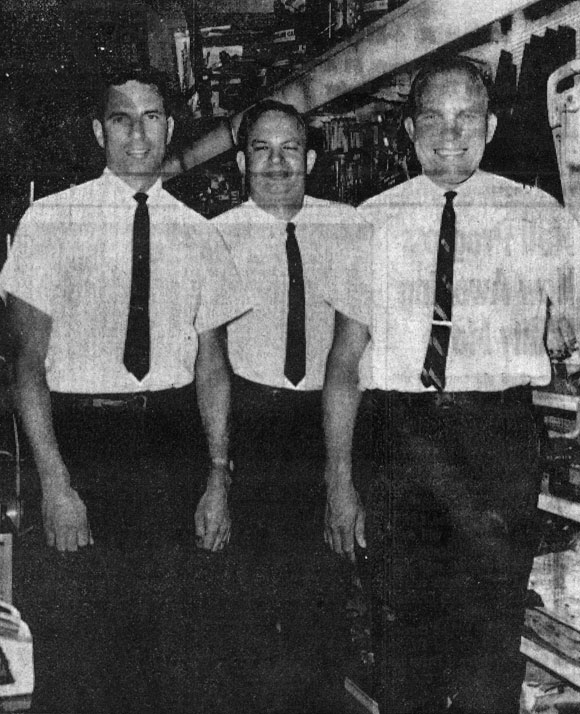
ex Enterprise flourishes at hands of brothers,
in Temple City Times, July 24, 1966, p2. No by-line. Full article near bottom of this page.
Grandchildren work Saturdays, summers, afternoons. There’s a procession of outside help. I remember Mary Beatty — Mrs Beatty, we called her — an energetic and responsible older lady who worked well with Ruth, and ultimately handled the housewares side (although Victor did the ordering). Her son was James Beatty, whose wife Jo worked there for several years; I believe Jo’s son worked there for a time, as well. There was also a Mrs Shenck; her husband was a hunter. I also remember the salesmen, Bill Bray from California Hardware, others from American Wholesale, someone from Hoffmann, California Electric, Larsen (Plumbing) Supply, California Tool.
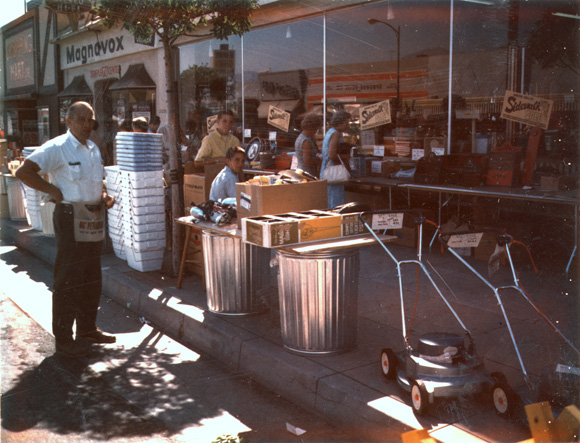
Sidewalk Sale, late 1960s judging by appearance of John (yellow shirt) and Mark Johnson (seated)
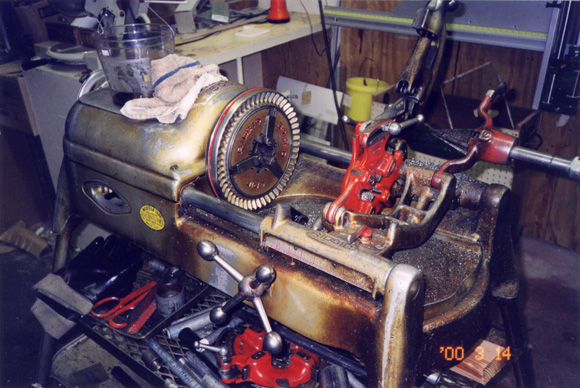
The Ridgid model 500 pipe threading machine. well maintained, original livery. Loud, but a pleasure to operate.
Customers. Names long gone; Victor and Steve would remember more. Joe Startin (of Startin’s TV, down on Lower Azusa) would come in, sometimes with his wife. He was a Brit, had worked in shipyards and come to this country with his wife; later he and Victor would take bike rides together. Some handymen were regular customers. One that stands out was Les — can’t conjure his surname: short guy, wiry, always in a hurry but always helpful, ready with a tip. Another was Ray Jennings (this is Victor’s memory, not mine). I remember a physician who came in some lunchbreaks, squatting before lower shelves, looking at stuff in back, out of easy eyesight. It was his way of relaxing. Another customer, John Lucas, was handicapped in some way, drove a customized car, came in on a customized wheelchair; he was smart, had wide interests and knowledge, used to ask for me by name. Victor thinks he may have been an engineer. Very sweet man.
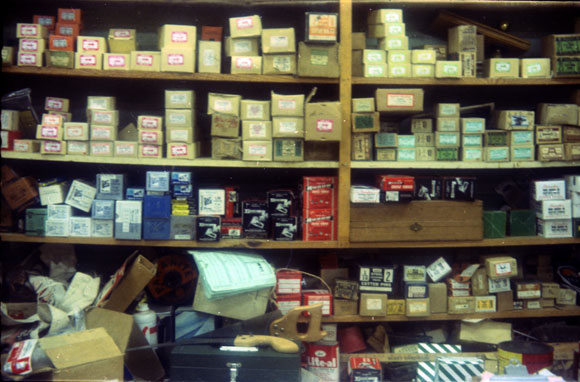
ca 1973, back counter by the glass cutter,
we would have said. Out of focus, but staples and, I believe, metric screws and bolts. Glass cutter arrangement out of view at right; glass kept at left, vertical boxes (once plywood sides, later cardboard). I recollect that there’d been boxes of springs there, to the right. Maybe they were moved to make way for the metric sizes? As for the beautiful lidded wooden box, did it contain circlip
snap or retainer rings? — beautiful, elegant spring-steel clips, requiring special circlip pliers. I think we kept (some) returns in that area, too.
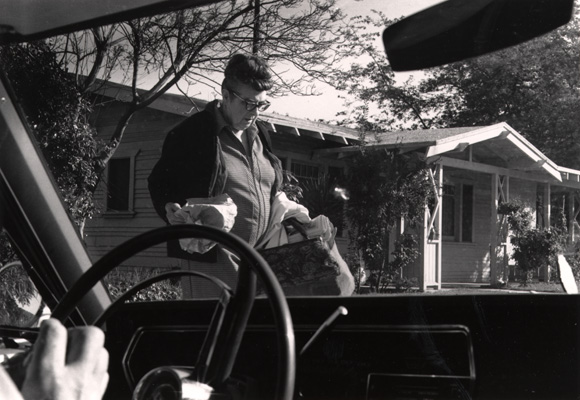
Ruth gets into the car for the trip from Eagle Rock to Temple City, ca. 1974.
The business owes its existence to Ruth’s imagination, mix of impatience and patience, doing. Here she is, some 60 years earlier with her graduating class, Blue Earth High School, Blue Earth, Minnesota.
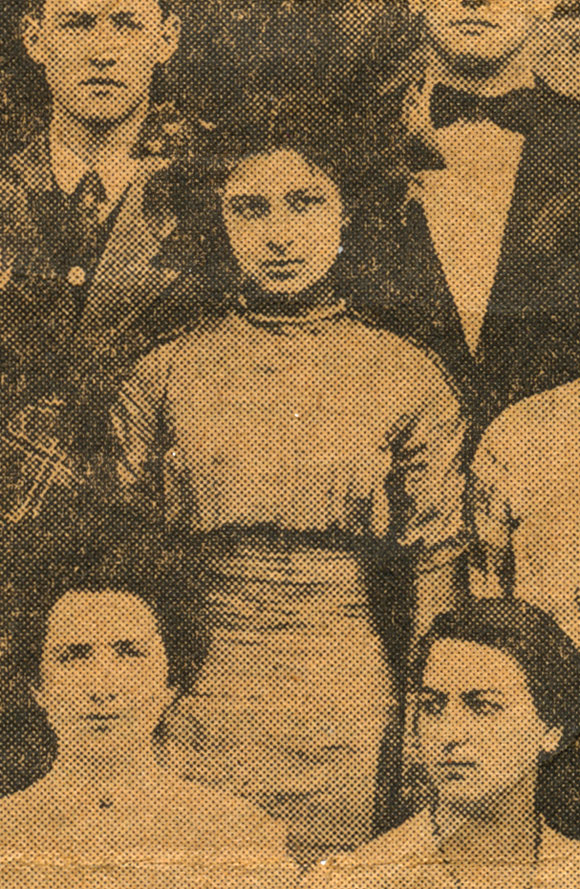
ex Golden Anniversary for Class of 1913, Tuesday,
in The Faribault County Register, Tuesday 25 June 1963. Scan of the article here
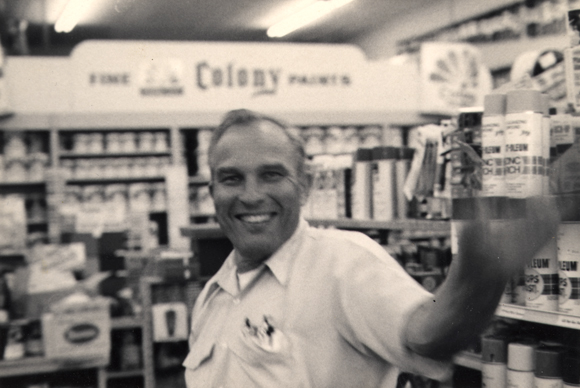
Victor, 1970s
Note : this image is referenced in the twelve ounce prophet writers forum here, in a discussion of old cans of paint, serious collectors.
(scroll down to 04-10-2007, 02:17 AM
— where dune493 writes : http://www.jmcvey.net/hdwe/victor_rustoleum.jpg , West Coast store that went out of business last year... hope someone got those old cans outta there. CRAP. Im a year late.....)
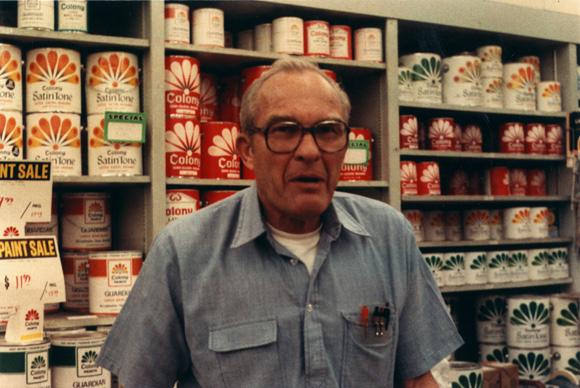
Victor, 1980s
Old things and hardware somehow go together. Nostalgia. Well-organized jars of screws, nuts and bolds, washers in a grandfather’s basement. Tools that still work, had we occasion to use them. The hardware store is a kind of museum. Victor assembles and displays a collection of Mt Lowe ephemera (that by now — 2008 — he’s given away to Michael Patris; see Mt Lowe photos and ephemera via the Altadena Historical Society, and particularly its links page.
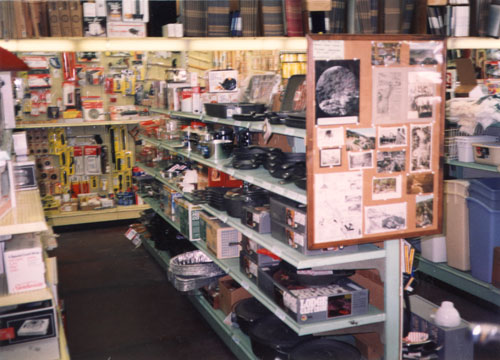
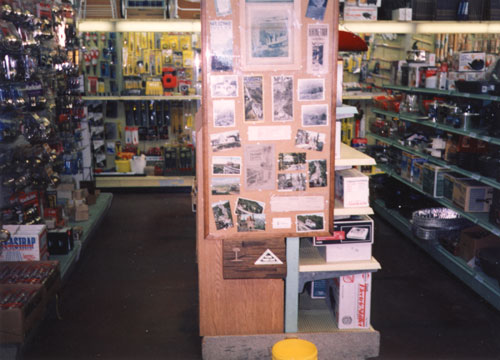
presentation of Mt Lowe ephemera at ends of gondolas (note cast iron cookware – a staple of hardware stores – nearby)
McVeys have hiked to Mt Lowe and beyond for many years.
some family photographs from the 1930s at Echo Mtn. Echoes (Fall 1998)
Mount Lowe Preservation Society
Roy dies in 1970, Phil in 1983. Ruth eases out, and dies in 1987. And now, 1997, Victor is out of the business for all but a day a week, to kibbitz with old customers. A son-in-law comes in, helps to modernize, improve the floorplan and presentation of stock. For a time, and despite the years and competition, the store does better than ever before. Housewares are gone, replaced by expanded electrical and plumbing sections. Competing family-owned stores die and the mega competition absorbs and/or kills each other off. Customers keep coming in, new and old, for convenience, service, coaching and support, for nostalgia.
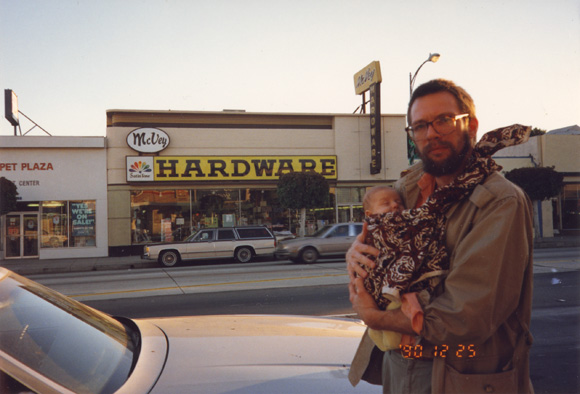
In this snapshot, probably the day after xmas 1990, I hold Euan not yet three months old in batik selingan. We’d just been in to chat with Victor and Steve. Highlight of that trip was a four-day expedition into California’s deserts (Anza Borrego, Imperial Valley, Death Valley, Mojave), to get the smell into Euan’s deep memory.
more temple city
Earlier today — 11 October 2009 — a search for McVey Hardware
turned up a couple of facebook pages devoted to Temple City. McVey Hardware is mentioned in both: I USED TO love Temple City — as of May 2011 here — and I love Temple City.
I don’t and never did live in Temple City; neither do I nor have I ever loved it. But I have strong (albeit undependable) memories of its retail center, around the intersection of Temple City Boulevard and Las Tunas Drive, and the part of my life that was spent there. I don’t share the animus (evidenced in the I used to love
discussion) about an Asian invasion: surely many of the businesses that are no longer there, would have disappeared regardless of what replaced them, as shopping habits and retail genres changed, and as those owners retired.
What follows is a list of the businesses I remember, with some help from Victor, from a specific time, the years during which I spent my Saturdays and summers at the hardware store — roughly 1964-1971 — and then a couple of summers and a good part of 1974 (when I’d dropped out of college for a year), and some visits in subsequent years. The sequence starts at Golden West, running westward along the even-numbered side of Las Tunas up to Encinita (Jack in the Box), and then across and back the odd-numbered side the same way (to Temple City Park and the public library). Occasionally, I turn off Las Tunas onto Temple City Blvd or elsewhere, for looks at businesses a few steps either way.
It’s a personal walk. I’m less concerned with getting it right,
historically speaking, than with identifying and examining those threads that stay with me.
- Orange Julius — This would later become Orange Delight, following some disagreement with the franchise’s policy, perhaps. The owner loved his business. He made his own secret formula, tossed a whole egg into the blender, made the best drinks. Good hamburgers, chili dogs too, I think. Most of all, I remember his beautiful voice. Victor says his son took over later.
- Fisher’s Drug Store — Soda fountain in back and, as I recall a pretty nicely designed interior, lots of modernist wood. Ca 1973, a Vietnamese family operated the soda fountain. They made hamburgers, etc., but were delighted to serve me fried rice, various delicious Vietnamese soup dishes. I was at least as delighted to eat them.
- Western Auto
- A liquor store in there (don’t remember the name)
- Graham’s Music — There was Mrs. Graham, also a son. A guitar player associated with that store bought a lot of tools from us, ran into difficulties, but we worked it out over time. These were good people.
- The Band Box — at the southeast corner of Temple City Blvd and Las Tunas; I believe my grandmother Ruth bought some things there.
- A shoe repair shop — around the corner, and one or two doors down.
- Brothers Pharmacy — I remember buying candy there, also paperbacks from their revolving rack, including Laurence Stallings (1894-1968) his The Doughboys: The Story of the AEF, 1917-1918 (1963), a long book which I read with gusto.
- Down Temple City Blvd — past a barber shop? — was a Dance Studio — Someone describes it as
Annette’s
but I don’t know what it was then. I thought about taking ballet/modern dance, as a teenager. Further down, I believe, was an inventory service; they’d send a team into the store, with little transcriber machines that recorded abbreviated comments like24 at 25 cents,
perhaps, on a disk. - Temple City Bike Shop — I bought my Raleigh
Meteor
there around 1969, for around $200 from Don Hansing. His wife, (attractive) daughter and a son all worked in the shop. Don’s brother Rob Hansing owned Montrose Bike Shop and was actively involved in the creation of the Encino Velodrome, movingly remembered here. The Temple City riders (of which I was one) sometimes met up with the Montrose group for some spins around the Rose Bowl, or Lacey Park. Another guy (and his sweet, quiet wife) took over after Don sold the business. I’d go in there on a mid-afternoon break and read from his vast library of comic books, drinking a root beer or orange crush. - Paradise Isle — a bar, also known as
PI
now evidently a karaoke bar. - Gunst Sporting Goods — Pop Gunst, his wife, and Ralph. Victor reports that they moved from west of McVeys, into this location, which a Magnavox store had previously occupied. They renovated the entire building.
- McVey Hardware
- A record shop — located between McVey Hardware, and Ray’s, for a while (ca 1970). I bought The Cream’s Goodbye there, maybe some other things too.
- Ray’s Barber Shop — I think there were three stations.
- Liden’s Stationers — They also operated a lending library, mainly recent fiction. I refer to Lidens during discussions of the
future
of the book, bookstore, library, &c., where even stationers re-enter the picture they were once a vital part of. - A supremely talented sign painter — behind Liden’s Stationers, name long gone. I still remember his wall-length
easel
arrangement, and the three-sidedOpen Sundays 9-1
sign he painted, that hung above the central cash register area. - Massey’s Hobbies — was in here (Victor remembers) and then moved a few doors down, to the east of McVey Hardware (I remember), where they finally went out of business.
- Hollinda — at the corner of Primrose. They may have expanded into one storefront east (where Gunst might have been?). Beautiful store of Dutch furniture, also Grundig radios (including shortwave!) and record players; and a great foods section in back. Catered to Dutch and Indonesians displaced from Indonesia, but others shopped there too, for sweets, various kinds of sambal, and other things that are far easier to find, now than then. The owner and his wife arrived in a nice car; she was tall, well dressed, glamorous. There was a well-dressed young daughter too.
- At next corner, Ross Optometrist, then I believe a natural foods store (a woman ran it), which eventually moved into the location vacated by Ross Optometry. Ross wore short-sleeved shirts, a tie, dark rimmed glasses that went with his dark hair. His wife, who may have worked with him, was ill (cancer?). He opened a shop for her across the street, where she sold gourmet items — salami, smoked cheese, maybe exotic spices and extracts — until she worsened. I remember an opening sale, later a closing sale. He loved his wife.
- Further up, the John Ridgel’s Academy (it’s called now, don’t know about 40 years ago) School of Beauty. I believe they were actually upstairs in these years, and that something else was downstairs, maybe a variety store? Not much impression, here.
- I'd forgotten but my father reminds me today (11 October 09), there was a store that sold Nazi paraphernalia, helmets and the like. Maybe not only German. I remember helmets in the window, gas masks. Victor remembers the owner was Chuck Tallman, and that he was tall; each evening, guys would go in there to talk, including locksmith (and gun collector) Lou Merritt. There may also have been in this block, or perhaps two blocks further down, a good bakery — I remember hot cross buns and the like. There was also, now that I think about it, a hair salon, also an insurance agency (or was it an accounting firm?) that had this interesting display in which, each day, a different news item would be shown, with a photograph as I recall (I need to look into this!).
- Shopping Mart — Where Ralph’s is now. The butchers opened a meat market (something with
farm
orcountry
in the name) on Las Tunas (same block as McVey Hardware), sawdust on the floor, but then I think moved further down to Jack’s Ranch Market, closer to Baldwin. - Ralph’s Market — I used to do the shopping there, for my father. I remember buying a lot of yogurt for myself. A woman who worked there as a cashier — a little older than me, and wiser — flirted with me (pulled my then-ponytail, once). It’s one of many regrets that I didn’t find a way to climb out of my own autism and respond the way I wanted to. I left to return to UC Berkeley, and on a visit a year later, found her working in the produce section. I knew immediately that I’d failed, in some way I couldn’t fully understand.
- A foreign auto repair service, and then Kenrich Baseball Cards — I spent hours here in later years — maybe during visits in the late 1970s or early 1980s — going through boxes of postcards. I may have bought old Los Angeles and Mt Lowe cards, but the largest purchases were of cards from Southeast Asia in general, and Indonesia in particular. Some of the latter can be seen here. Victor informs me that Wonder Cleaners was in here somewhere (where he took drapes to be cleaned), and also a lamp shop. Neither left an impression on me.
- Temple City Honda, then further down a frame shop, where I remember buying little plastic boxes to hold things, and vaguely remember a selection of artist supplies as well. There may also have been in this block Temple City Printing where the presses ran in back, the smell was of ink and grease, and you could buy pads of paper made from trim.
- And then Jack in the Box — where I believe you could get tacos.
- Across the street, (maybe a block further down?) was Temple City News — Green building. Newspapers out front, books and magazines, as well as tobacco, inside. I still have paperbacks I bought there over 40 years ago — basically Signet classics and the like, some Avon science fiction, a book about computers.
- An Altadena Dairy was nearby.
- Before proceeding, I should mention Dootson Driving School, that was a couple of blocks beyond the news stand. I remember Mr. Dootson as a customer in the store. It was up there near the MarBet Apartments, Victor remembers, whose custodian came into the store frequently.
- A furniture store occupied the corner of Las Tunas and Oak (or Cloverly) specializing in maple, run by a very well-spoken — by which I mean, articulate, gracious, even musical in his expression — gentleman. I remember him (and his wife) as customers in the store; this may have been his family's business. The word
colonial
might have been in its name. - Ray Youman’s Chevron Station — I remember Ray (shown broom in hand) well, as a customer in the store, and as head of a very active service station. I believe his athletic son was deaf, or near-deaf, and may have studied at Gallaudet College. There was a daughter (Victor thinks she was Rosemarie) who would later run the operation. Victor also reports that Ray came back from the war with a German bride. Ray was a big guy, very nice. Side story: The only time I’ve ever driven a sports car was to take Rosemary Rhodes’s red Corvette to Ray’s station, for a fill-up. Rosemary came in once a week to do bookkeeping for the store. Very glamorous, beautiful husky voice.
- Temple City Lumber
- Winchell’s Donuts — Where you could get buttermilk donuts, not available in Massachusetts.
- Up Oak Street was the Post Office; I seem to recall a plumbing supply house there, Victor says it’s called
Agosta.
- Don’t have much memory of this block : there was a bar, and Earl’s Diner at the corner, catty-corner from Hollinda. I ate there a few times. Earl was always there; as was the waitress.
- After a bank (now Bank of America, then something else) was Cool’s Candies — which had just about everything, including toffee and peanut brittle. Further down, Temple City Camera, owned in my time by Darryl Antrim (or Daryl?). I bought my Canon Ftb there, a lot of film, a lot of processing. A young guy worked there who would later work at the Eagle Rock Post Office.
- Liebergs was the local department store — there may have been another store in Alhambra. I remember getting some things there before going away to college (San Jose State), including a bedcover that we still have. Those small-town department stores are gone, I suppose. It reminds me, in memory, of Ivers Department Store in Highland Park (a whole other story for my family). Liebergs was Bert Anspach.
- Sprouse Reitz. There may have been another shop between this dime store and Vernon’s Drug Store, at the northwest corner of Las Tunas and Temple City Blvd.
- Around the corner and up Temple City Blvd was a bar (name forgotten), also Sherwin Williams Paint. I must have gone in there on occasion. We sold Colony paint, not SW (which we had sold back in Culver City); I probably thought that paint dealers had deeper knowledge in paint than hardware dealers (the same would go for plumbing and electrical supply houses). Victor informs me that the owner committed suicide by jumping off his roof. One-story building, must have dived.
- Further up was the Alpha-Beta supermarket — interesting story about how it got its name, here.
- Across the street was Temple City Lock (Lou Merritt, mentioned earlier), and Temple City Typewriter, where I purchased my Remington-Rand for $50 maybe 40 years ago. It got me through high school and colleges, and I'm still using it for envelopes and sometimes more.
Doehler 2
is stamped into its underframe, maybe dating it to around 1950. - At the northeast corner of Temple City Blvd and Las Tunas, a travel agency where, for a school project, I obtained a brochure about South Africa. Curious, I expect one day to travel there, in part to see a friend in Cape Town, but also to research telegraphic codes and message practice.
- Further down that block were Stoppel’s (boys wear, also men?) and Dominic’s Shoes, that surely furnished me at some point. Way down in the next block was
- a toy store —
Allen’s Toys
, maybe? — that had a great selection of Matchbox trucks and other vehicles. - Next door to the toy shop, a tabulating service — They’d leave the front and back doors open (it must have gotten hot in there!) and you could listen and look in on the Hollerith punch cards getting run through their routines.
- I'm going to end this tour at Temple City Park. I used to bring a lunch there, either one I’d made, or gotten at Orange Julius or even from McDonald’s further down the road, sit under a tree, eat it and read. Sometimes I’d go into the library. That was my lunch break.
I was prompted to write these notes by the two facebook group
wall
discussions mentioned earlier. I imagine that sentimentality is among my motives for maintaining these hardware pages, but it’s got to be more than that. Places are not a picture. They're part of the fabric of our lives; we carry shreds of them around with us. I don’t wish to return to these memories or somehow live in them. I carry pieces of them around with me, even here in Cambridge Mass.I realize, having gotten this down, that there is more to write about my time in the store. The
gypsie
woman — a customer — who one day told something like my fortune : You likethings
she said, nice things. She was probably right; there I was, working (and accumulating), rather than learning and creating. Now, I am become secretary to the memories and detours that constitute my life. I think of other conversations that weren’t pursued, opportunities barely acknowledged, smiles that I allowed to lead nowhere. Lots of conversations.
cambridge
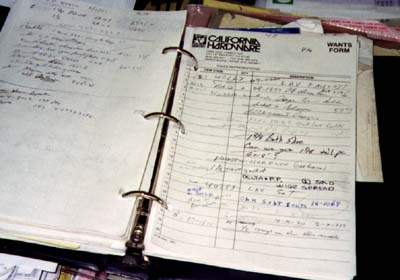
open want book, March (?) 2000.
The store looks better now than it ever has. Housewares are gone, for the most part; stock is deeper in electrical and plumbing. Items hang from hooks, mainly. The inventory vestiges of an earlier time, that used once to survive for decades in the dusty recesses of lower gondola shelves, are no more. The selection is more focused, deeper.
Competitors have come and gone; survivors, chain and independent alike, are smarter, maybe tireder. Home Depot help know their stuff, probably more systematically than our old-style amateurs. A lean hardware store may no longer be suited to a suburban market of large lots and low population density.
Victor comes in Saturdays, Sundays (even less now, in 2003). Steve is there more. A son-in-law made a difference for a while, but is now on his own as a handyman/contractor. The business no longer needs to support families, and next generations aren’t interested anyway. The neighborhood’s changed. Seachange nears.
The existential condition of the hardware man: to know a little about a lot, and be an expert in no thing. To improvise, extemporize, extrapolate. An inclination to philosophize comes with the trade, perhaps because the trade is social. People come in with a problem. There’s an encounter, lessons. And too, the hardware man works less with tools, than he thinks about working with tools. Hence philosophy. Something about tools, about working with things simple and complex. Something about how a tool should fit as lightly in the hand (or mind) as a dowsing rod. This may be from David Gelernter: Tools, being specialized extensions of the hand, tend to narrow focus where a widening may be called for. Heidegger’s broken hammer enters the picture. Pirsig on motorcycles.
Hardware anecdotes surface in my teaching. The ends of ironmongering are like Sidney’s for poetry, to teach and delight. And to the constant refrain about the importance of drawing to all human activity, and therefore to its fundamental role in education, one shows how thumbnails are drawn to illustrate a plumbing point: pen on palm. It took no special education to achieve that.
liquidation
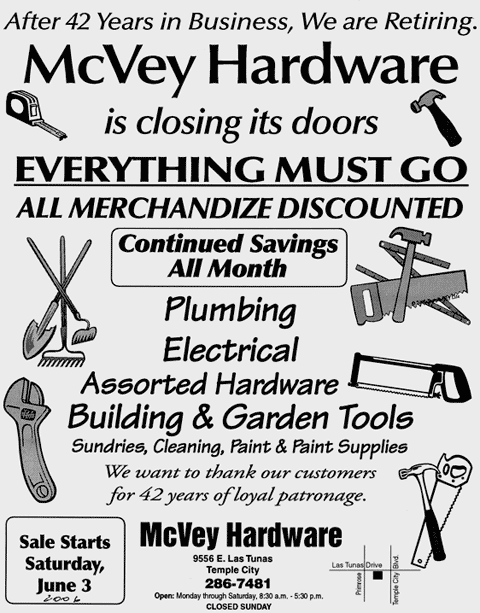
Ad seems to have been prepared by Temple City Life. 2006 in Victor’s hand.
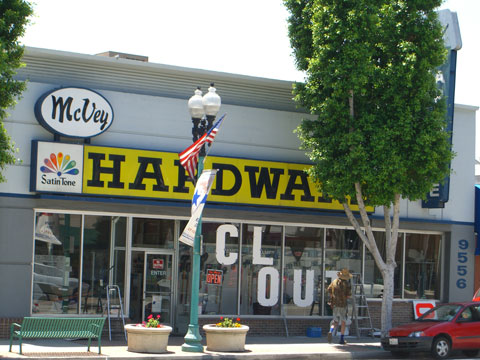
The Satin Tone sign is a vestige of earlier paint selling days.
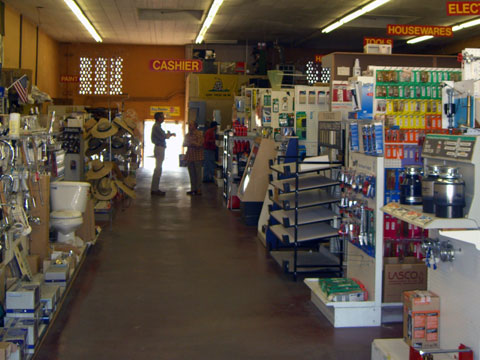
Steve’s unmistakeable profile.
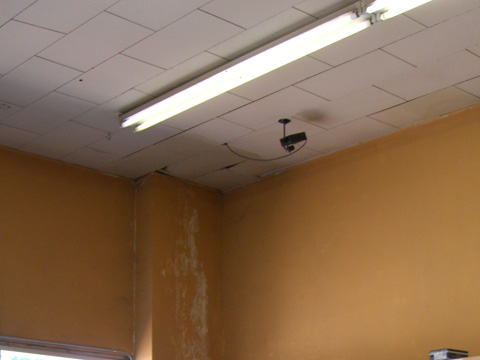
Surveillance.
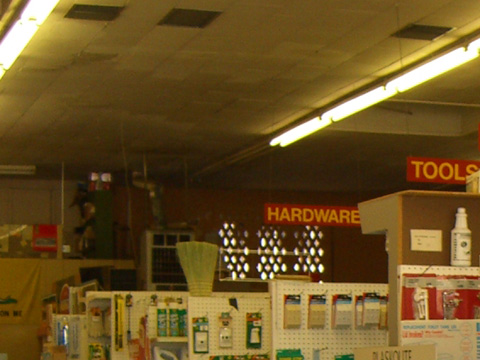
Sons (this one included) used to read and draw at the oak desk in the upstairs office. yellow ledger interleave sheets were the surface of choice. the furnace could make it hot and noisy.
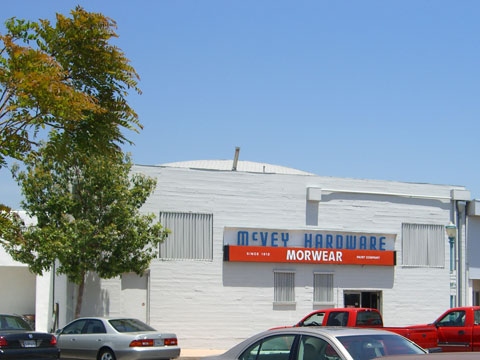
Old Colony Paint, then Colony, in the end Morwear.
The images above are derived from the several photos of the store at loopnet, a commercial real estate service, with permission.
The images below courtesy of Margaret McVey Thomas. The store has been fortunate in the help; these are good guys.
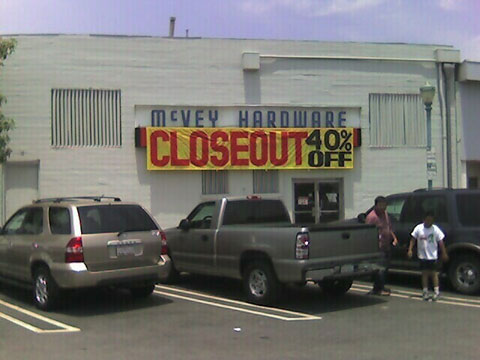
40 percent, going to 50 percent
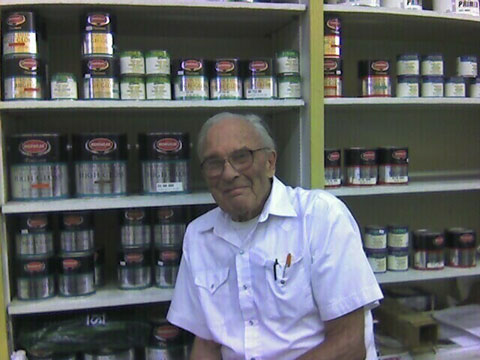
Victor
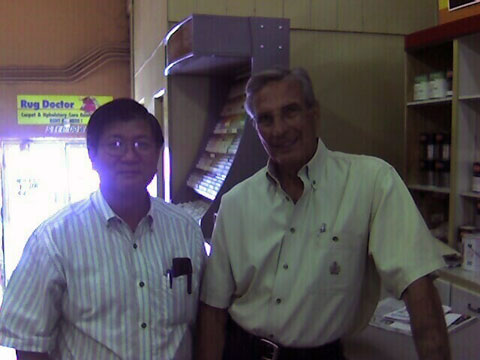
Shuman Ngo (came from Hong Kong, a big help with the Asian customers), and Steve
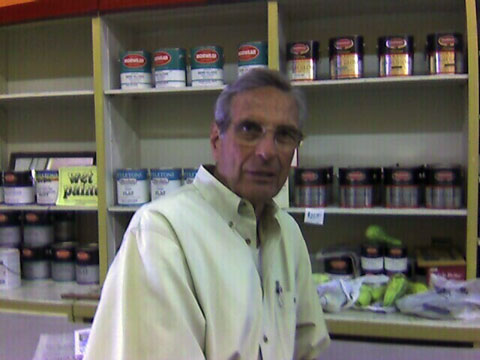
Steve, before what’s left of the paint. Note the squash on the counter, courtesy of a friendly customer. Not infrequently, customers brought in vegetables, fruit, avocados.
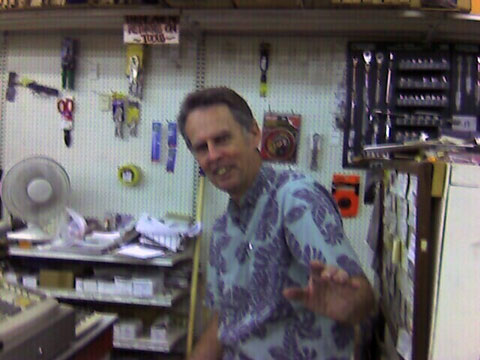
Bob Rode (headed for North Carolina)
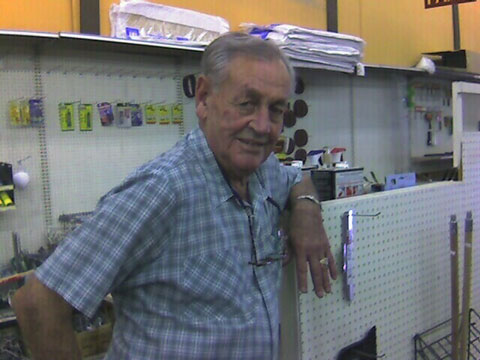
John Acres (managed a construction crew on major projects)
valedictorian letter
A valedictorian letter to the editor appeared in the Pasadena Star News on 22 September 06. It’s long gone from their website, but here ’tis, with Mr. Albert’s kind permision —
Hardware store gone
So we’ve lost McVey Hardware in Temple City.
The gentleman who is always in attendance to help the helpless, clue the clueless and remind us what customer service is all about assured me that there is nothing sinister involved. It’s simply time to retire. But I do believe I detected a subliminal eye-roll. I can’t help but believe the decision to pack it in was helped along by knowing that the city officials in charge pay great lip service to bringing customers to downtown Temple City. They themselves toodle on down to the behemoth a bit down the street for their home project needs.
Without sounding like an alarmist lamenting the impending loss of all small retail stores, I would like to relate something that actually occurred. This is the story of my quest to obtain some Naval Jelly.
For those of you who are unfamiliar with the substance, it is a rust dissolver. While people who don’t work around rust-prone material might be forgiven for being unfamiliar with the stuff, I would naturally assume that anyone employed by any purveyor of construction material and related objects would readily recognize the name.
My excellent adventure began with a simple request from my boss to do a run to — well, I’ll just call it the place whose name sounds like the bus station in the town from whence one came.
So off I go. The first employee of whom I requested the location of Naval Jelly looked at me as if I had inquired about Napoleon’s grave. I told him what it was. We looked. We didn’t find. I said no problem
and trundled off to locate it myself.
After a few trips around the store, I asked yet another employee. Same blank stare. I was on the clock. Taking this much time to obtain one 12 ounce bottle of gunk was simply not cost effective. I envisioned myself eventually contacting all the available floor help, including a female worker who, upon being asked, Excuse me. Could you show me where you keep your Naval Jelly?
, might slap the loogie out of me. I concluded that it was just not worth it.
I left, took the three or four minutes it takes to get to McVey’s and asked the man at the counter about Naval Jelly. He told me, I got it, paid and left. Mission accomplished.
I have come neither to bury the big box stores nor to praise them. I have related but one incident. But it is a red flag. The large retailers admit that, due to their purchasing policies, there is a slight decrease in product choice. If Wal-Mart, Office Behemoth, etc., become the only options, will we see a severe lack of selection? Will retail expertise become essentially passe? Customer service a lost art? Observe the way satirists lambaste the so-called help lines
, and we may have a view of the future.
Heck, I still miss Leo’s Penny Burgers and Barron’s Pharmacy. And I do worry for a world where CVS, Kohl’s, etc., end up buying each other out to form a massive Depot-Mart where one can obtain anything from broccoli to brain surgery under one roof. But that’s just me. Life goes on.
So goodbye to my favorite hardware store and happy retirement to the McVey family.
Earl Eager Albert
Temple City
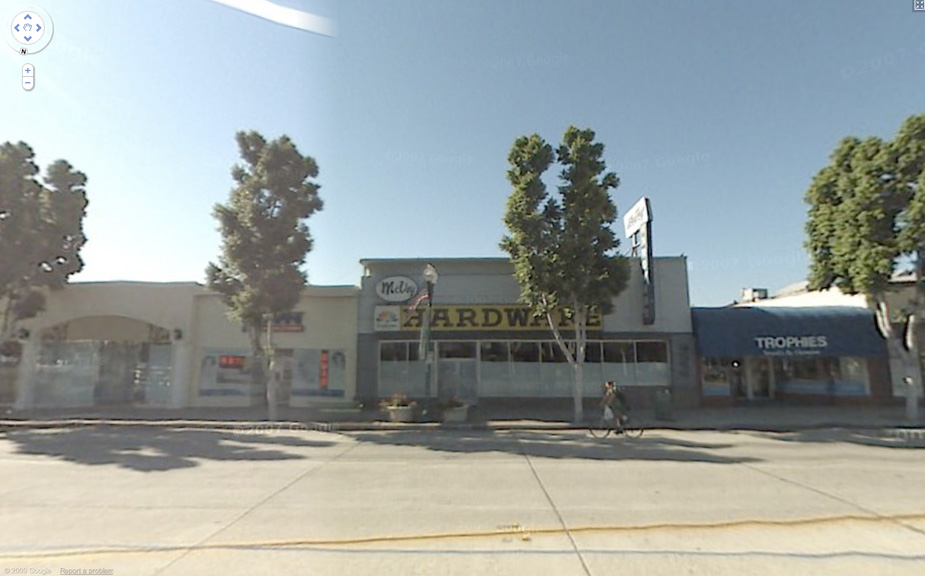
As captured from a Google street view, August 2009. Photo is watermarked c2007.
9556 E. Las Tunas is now (May 2010) a cool-sounding Chinese restaurant called Green Island,
apparently opened in late 2008. Ate there today (25 November 2010): excellent. Temple City looked pretty good, too.
Victor McVey, 1923-2010
Victor Warren McVey, hardware man, cyclist, enthusiast in a variety of realms, died on Thursday, 18 November 2010, in Pasadena. He was 87.
He was born in Los Angeles in 1923 and lived in Eagle Rock his entire life, enjoying his home and its view of his beloved San Gabriel mountains for many years.
He was a graduate of St Dominic’s elementary school and Eagle Rock High School (after three years at Cathedral). At ERHS he took a drafting course that led to drafting work at Lear Avia in Hollywood, where he drew actuators and other aircraft components. He was always good with the pencil (it earned him some deferments). He later served in the U.S. Army in England and Germany, and finally the Philippines as a prison camp guard. He returned to earn a business degree at Loyola University, and then worked for some years as a salesman for wholesaler Union Hardware. He married Patricia Ronayne in 1950, with whom he raised a family of four children. In the mid 1950s, he joined his brothers Steve and Phil, and his own parents, in taking over Miner’s Hardware in Culver City; they moved the business to Temple City in 1964. McVey Hardware was a well-loved business in that community for many years, until finally closing its doors in 2006.
He enjoyed his family and working around the house on his Wednesdays off. He loved cooking (barbecue-ing, cooking with his wok, making tacos, etc.). He built his own smoker (used mainly for fish caught by his own father); had sourdough starter going for a few years; treated his family to lamb and Yorkshire Pudding on Christmas. He enjoyed camping, backpacking, dayhikes, Sunday drives to San Pedro, Terminal Island. He infectuously loved the desert and mountains, and developed a significant collection of Mount Lowe materials that he displayed at his hardware store and later donated to the Mount Lowe Preservation Society. He loved railroads, in particular steam, and rode the UP 3985 Challenger on a one-day outing over the Cajon Pass into the Mohave. He loved cowboy
and Cajun music, played guitar, banjo (for a while) and, later, harmonicas that he’d bring with him for jam sessions at music festivals. He loved his yard
(garden) and trees (avocado, kumquat, etc.), and in younger years took on some ambitious (Sunset Magazine inspired) building projects (most memorably a hut on stilts, for his children). He enjoyed reading JBS and other right-wing political literature and complaining about the Los Angeles Times (to which he reluctantly subscribed after the Herald-Express disappeared).
He was a serious bike rider (in pre-composite, sew-up
-tire days), who outlived his cycling buddies.
He was a wonderful, complicated father who may never have known quite what to make of his children. They, however, derived from him spirits of independence and curiosity: all four pursued adventures in different lands and realms. He enjoyed seeing and keeping up with his grandchildren.
His wife Patricia died in 1969. He is survived by his children John (Cambridge, Mass.), Margaret Thomas (Pasadena), Catherine Heinlein (Covina) and Tom (San Diego), and his grandchildren Victor, Kelly, Euan, Emily, Sarah, Jenny and Chisaku. He is also survived by his sister Lois Johnson and brother Steven.

Los Angeles Times, December 1, 1950
Temple City Times articles
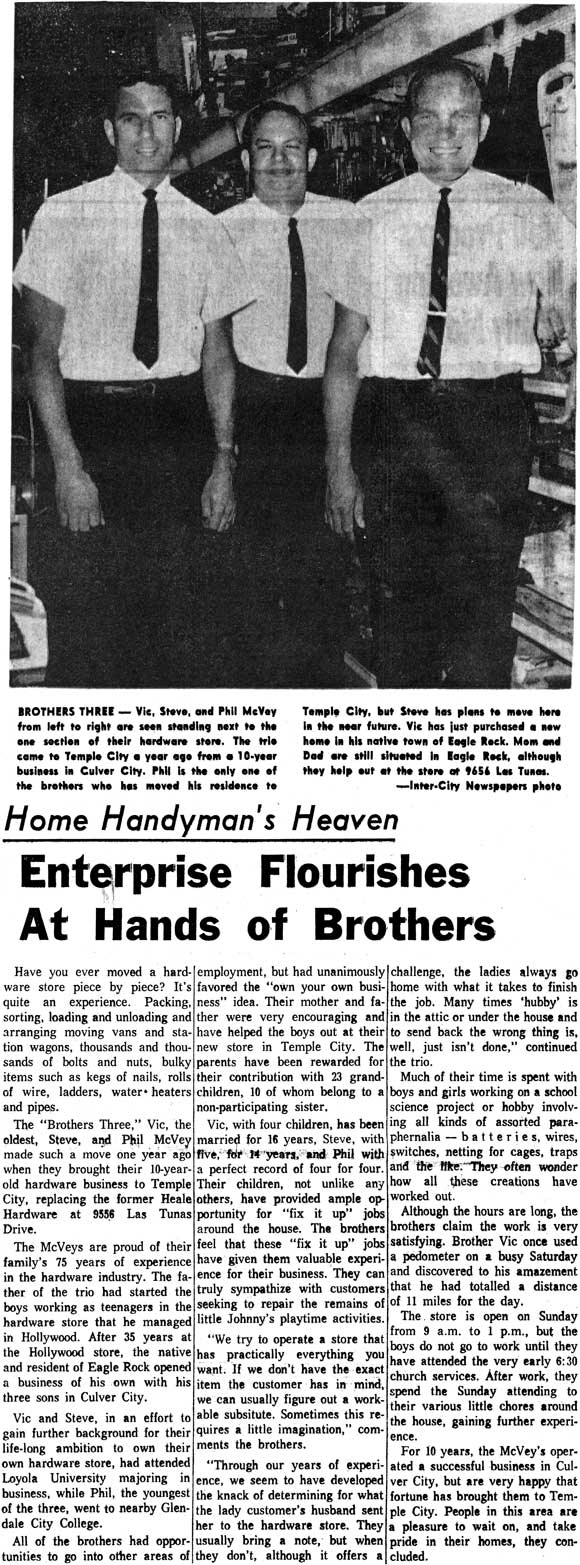
Temple City Times, July 24, 1966, p2.

ex Temple City Times, Thursday 2 September 1976
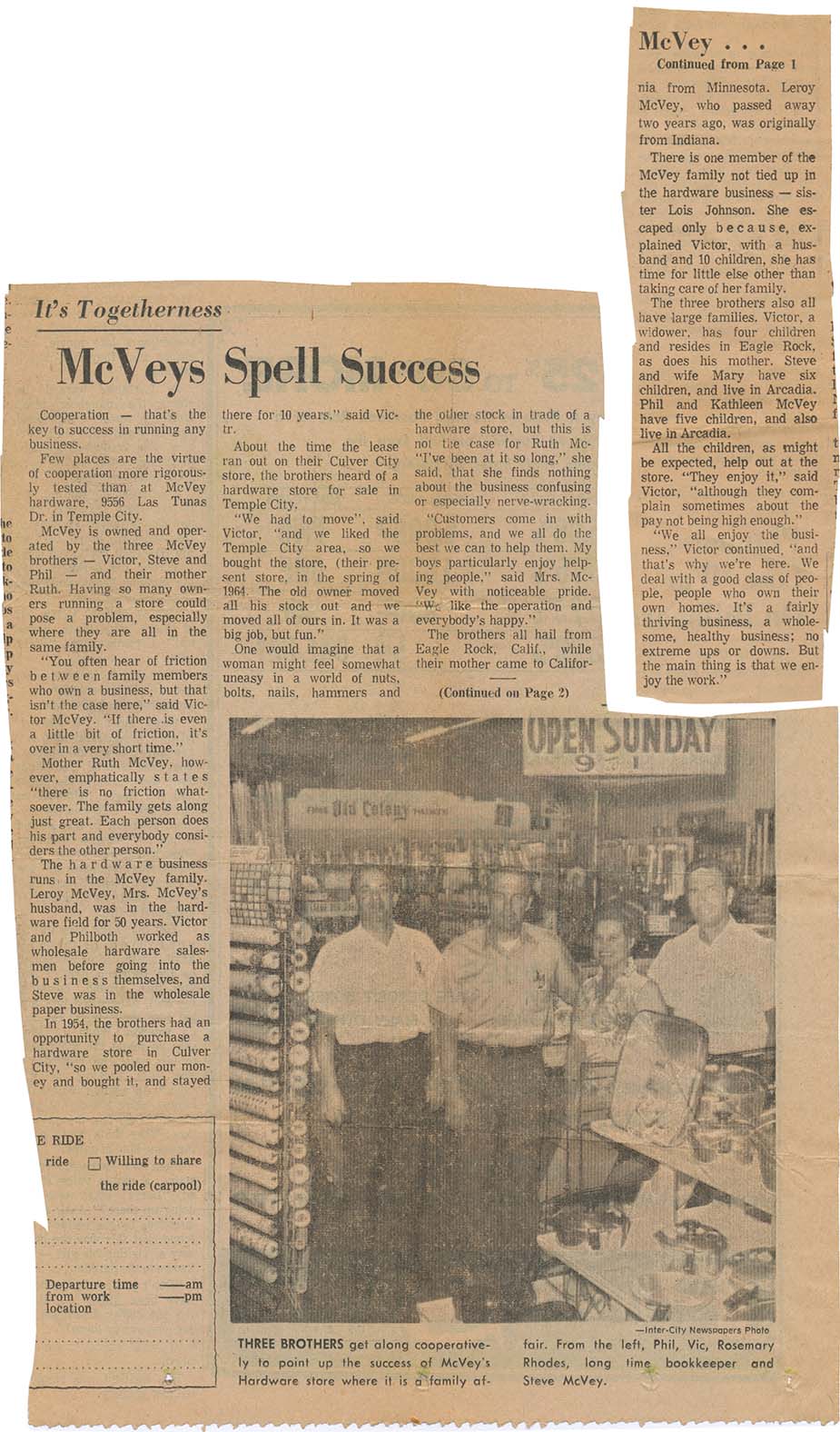
Temple City Times (? ca 1972, based on internal evidence: Roy died two years before)
An article entitled McVey Hardware: A genuine hardware store operated by genuine people,
by Philip Pettus, appeared in Temple City Life (published by the TC Chamber of Commerce), October 1999.